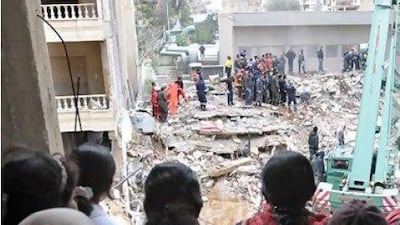Our Filipina housekeeper missed death by five minutes on Sunday evening. Three of her compatriots, however, kept their grim appointment when the Beirut apartment building that housed their Sunday social club collapsed into a pile of rubble in less than 60 seconds. Twenty-four other tenants - 11 Lebanese and 13 other foreigners, including Sudanese and Egyptians - also perished.
The incident has embarrassed the state and held up to further ridicule Lebanon's paper-thin bureaucracy and the breathtaking ineptitude of its public officials. The Lebanese laugh about the incompetence of local government, but after 30 years of corruption, greed, negligence and now death, the joke is wearing thin.
The foreign media, and the PR departments that feed the hunger for column inches in the weekend supplements, know nothing of the lives of the vast majority of Lebanese who live in an urban environment far removed from the glamour we read about in the glossies. The clichés of the tourist guides are right. Beirut is a city of contradictions, but Sunday's tragedy highlighted a darker paradox, one that has exposed the lie of Beirut being a vibrant city on the rise.
For every street corner in the capital and its environs that has a 30-metre hole in the ground ready to receive thousands of tonnes of concrete for so-called luxury residential apartments, there are hundreds - perhaps thousands, who knows? - of blocks of run-down housing.
Many of the families that live in them pay what is known as old rent - about 10 per cent of real rates because they are pegged to pre-inflationary rents - and many landlords cannot wait to get them out so they can either look for tenants who will pay the going rate or sell the land to developers eager to cash in on the building boom.
When the building on Al Moutran Atallah Street collapsed, initial reports alleged that the landlord had given up on maintaining his property years ago. Survivors, speaking from their hospital beds, claimed he had stopped collecting rent (understood to be about US$200 [Dh734] per month for each of the 10 apartments in the building), while others claimed that he wanted them out so that the block could be demolished and the land sold. It does not take much for the Levantine mind to take these scenarios and reach an even more sinister conclusion.
Successive governments have been avoided revising the rent law as they knew it would create a housing crisis with as many as 80,000 families out on their collective ears and having to pay "modern" rents (a minimum of $400 per month in greater Beirut) in a country where the minimum wage is still $333.
And all the while, Beirut, and the rest of Lebanon for that matter, ploughs on with its construction boom, mainly for high-end homes. It is a property revolution that is being carried out under a blanket of local government corruption that would make Naples look like Zurich. The Beirut municipality has pledged to look into the construction status of all old buildings, but the promise is laughable. There isn't the manpower, the expertise, the transparency or the political will to make it happen.
The government cannot ignore the matter for much longer. Not only is there a simmering social crisis, Sunday's collapse also reminded the Lebanese of what would happen in the event of a powerful earthquake. I joked with a civil engineer friend that we would have 200 collapsed houses and he laughed.
"Add another zero and you'd still be way out," he said. He had a point. The local media on Tuesday were bandying about a figure of 20,000 buildings in a similar state of woeful disrepair.
My housekeeper attended a service for her dead friends on Tuesday. She now sits in her room and reads her Bible, trying to comprehend not only why her friends died, but also possibly why she survived by a matter of minutes. If she now hates this country, I for one don't blame her.
Michael Karam is an associate editor in chief of Executive, a Lebanese regional business magazine
